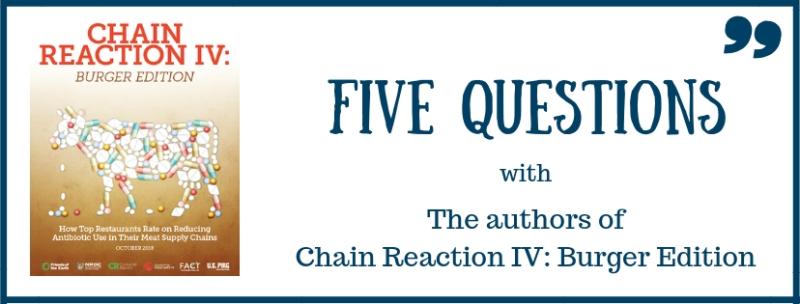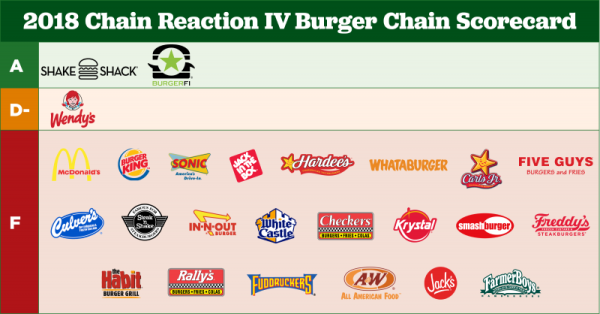Expert Spotlight: Chain Reaction IV Report
Chain Reaction IV: Burger Edition is a recently released report that ranks America’s 25 largest fast food and fast casual restaurants on their antibiotic use policies and practices in their meat supply chain. The report, first issued in 2015, was produced by the U.S. Public Interest Research Group, Friends of the Earth, Natural Resources Defense Council, Center for Food Safety, Food Animal Concerns Trust, and Consumer Reports. We talked to the authors of the report to learn more about their findings.
1. Can you tell our readers about the history of the Chain Reaction Report and Scorecard? How and why did it start? What’s the process for producing it?
For the last four years, a group of leading consumer, environmental and public health organizations have graded top U.S. restaurant chains on their antibiotic use policies. In light of the need to improve antibiotic stewardship in the beef industry, this year’s report evaluates antibiotic use policies in the top 25 U.S. burger chain restaurants. We shifted focus to this sector in 2018 because burgers are one of America’s most beloved and iconic foods, and burger chains can have a meaningful impact on the beef industry’s practices. Though not our primary focus, Chain Reaction authors also surveyed and reported on progress related to antibiotic use across all meat and poultry supply chains of the nation’s top 25 fast food and fast casual restaurants (some companies overlap between the two scorecards.)
“There’s nothing more American than a hamburger. But for the sake of our health, we need influential restaurants such as McDonald’s to take a bite out of antibiotic overuse in the beef industry,” said Matt Wellington, U.S. PIRG Education Fund’s Antibiotics Program Director. “Restaurants need to demand antibiotic restrictions from their beef suppliers. We simply cannot afford to lose life-saving medicines to produce a slightly cheaper burger.”
The overuse of antibiotics in food animal production contributes to the spread of antibiotic-resistant bacteria, and poses a critical threat to public health. Fast food and fast casual restaurant chains, which are some of the largest meat buyers in the U.S., can help encourage meat producers to change their practices by only sourcing meat raised with responsible antibiotic use.
“When antibiotics stop working, diseases become harder to treat, life-saving surgeries riskier to perform, and a scrape on the knee can even turn deadly,” said Jean Halloran, Director of Food Policy Initiatives in the advocacy division of Consumer Reports. “Consumers are concerned about antibiotics losing their effectiveness and want meat producers to adopt more responsible practices.”
To evaluate restaurant policies and practices, the authors directly surveyed companies and reviewed companies’ public statements. To be considered a meaningful antibiotic use policy, a company commitment must, at a minimum, prohibit all use of medically important antibiotics for growth promotion and routine disease prevention purposes. Policies that only prohibit growth promotion are not sufficient and did not receive policy points. If a company’s public information did not match internal communications with the report authors, then the authors graded the company on what was publicly available.
2. What are some highlights from this year’s report and scorecard?
- Failing grades for most chains: Twenty-two burger chains received an “F” grade because they lack meaningful policies to govern antibiotic use in their beef supply chains.
- A new generation leads the way: BurgerFi and Shake Shack received the only two “A” grades in the burger scorecard. Both companies currently serve only beef raised without antibiotics.
- A baby step by a big company: Wendy’s received a “D-” because it buys 15 percent of its beef supply from producers that have reduced the use of one medically important antibiotic, tylosin, by 20 percent. The policy represents progress, yet is far from comprehensive.
- Don’t just take their word for it: Shake Shack and Wendy’s, two of the three burger chains with passing grades, got points for using suppliers who have a third party verify their antibiotic use.
- Intention without follow-through: McDonald’s, the largest beef purchaser in the United States, has announced a vision for antibiotic stewardship for its meat supply chain, but hasn’t committed to a timeline to implement it beyond chicken. In-N-Out Burger also has publicly pledged to source meat raised without routine antibiotics but it hasn’t committed to a timeline either.
3. Previous reports noted how fast food companies in the U.S. are addressing antibiotic use in poultry, yet most companies have made few strides in reducing antibiotic use in pork and beef. Has this changed at all?
The first three Chain Reaction reports surveyed the top 25 U.S. fast food and fast casual dining restaurants on their antibiotics policies and practices for all meat served. Those surveys found that while many top restaurants pledged and implemented antibiotic use policies, most were limited to chicken. Chain Reaction III noted that, with a few exceptions, “companies have made little progress in reducing the use of antibiotics in their pork and beef supplies.” According to the latest FDA drug sales data, the beef industry accounts for 43 percent of the total livestock sales of medically important antibiotics, more than any other sector.
“Restaurant policies helped move the chicken industry beyond the federal requirements for antibiotics in food animals, but lack of meaningful action by the beef industry underscores the need for regulations to move the needle forward,” says Rebecca Spector, West Coast Director at Center for Food Safety. "If the industry is able to keep dragging its feet, the antibiotics crisis will only worsen."
Burger chains have a crucial role to play in reducing antibiotic use. McDonald’s, for example, is the single largest purchaser of beef in the United States. To protect public health and push the beef industry to eliminate the overuse of antibiotics, restaurants—especially burger chains—should commit to sourcing beef from producers that use antibiotics only to treat animals diagnosed with an illness by a licensed veterinarian or in limited circumstances to control a verified disease outbreak. So far, however, few have done so.
“Cattle are adapted to graze on pasture. We could eliminate most of the antibiotic use in the cattle sector by keeping cattle on pasture longer and making sure they get enough hay at the feedlot,” said Steven Roach, Food Safety Program Director for Food Animal Concerns Trust. “Antibiotics could then be reserved for treating the much fewer sick cattle and not misused to prevent problems caused by how cattle are raised.”
“People want better burgers and the companies taking note are seeing better business,” said Lena Brook, Acting Director of Food and Agriculture at the Natural Resources Defense Council. “With more of these miracle drugs going to cows than to people, the beef industry has a responsibility — and an opportunity — to help keep them working when sick people and animals need them. Most fast food restaurants are putting burger lovers in a bind. If they want responsibly raised meat, right now, chicken is the best choice at many mainstream chains.”
4. Some of the companies on this list are global. Are the companies that scored well in the U.S. also implementing good policies in the other countries where they do business? If not, why?
The World Health Organization considers antibiotic resistant bacteria a top threat to global public health. Experts predict that without extensive action to stem bacterial resistance to antibiotics, common infections are likely to become a leading cause of death once again. A 2016 report commissioned by the United Kingdom estimates that unless steps are taken to control antibiotic resistance, global deaths from drug resistant infections could reach 10 million per year by 2050, more than current deaths from cancer. In response to the gravity of the situation, the United Nations convened a special session of the General Assembly in September 2016. It unanimously adopted a resolution in which all nations committed themselves to taking action on the problem.
This global problem will require a global solution and companies should think through their entire meat supply and the impacts it has on public health. Although global commitments are an important next step, Chain Reaction grades companies on the antibiotics policies that apply only to their U.S. restaurants.
5. The market alone cannot fix the antibiotic resistance crisis. What do you think the U.S. government, and governments around the world, should do to protect people from the rising threat of superbugs?
“In the absence of federal policy, companies must take action to address their contributions to this crisis," said Kari Hamerschlag, Deputy Director, Food and Agriculture, Friends of the Earth. With so many antibiotics going to cattle, we urge the U.S. beef industry to follow the lead of the chicken industry and take decisive action on this issue. High-profile restaurants, like In-N-Out Burger and McDonald’s, must make good on their stated commitments to eliminate or significantly curtail the regular use of these drugs in their supply chain.”
While restaurants and major meat producers have critical roles to play in stopping the overuse of antibiotics, the government must also act to achieve the kind of lasting, industry-wide change needed to fully protect public health. Policymakers should only allow beef producers to use medically important antibiotics under the guidance of a licensed veterinarian, and to treat animals diagnosed with an illness or to control a verified disease outbreak. Policymakers should also set national goals for reduction of antibiotic use in food animals, and dramatically improve collection and disclosure of antibiotic use data. Comprehensive policy reforms will ensure that all meat producers across the U.S. meet the same responsible antibiotic use standards. These reforms are vital to preserving life-saving medicines for the future health of both animals and people.



